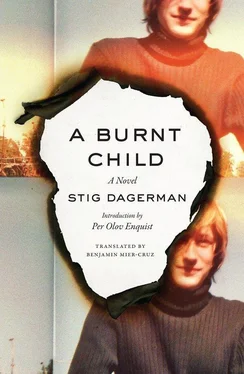You also wrote that you would prefer to come back as soon as possible. My dear, you shouldn’t cut your vacation short for me! There’s nothing going on here in the city, but even if I could visit you, you know very well that I can’t keep taking your money as you have suggested, especially not since you spoke to your parents about it. It would be too humiliating. So I’ll just stay here in the heat. But I’m with you the whole time in my thoughts. You also asked whether I go to the cinema a lot. No, I don’t. Most of them are closed, especially the ones that usually have interesting pictures. Besides, you know that I really don’t care for films.
You don’t have to be worried about me. As far as I’m concerned, there’s nothing to be worried about. I’m over the most painful part of my grieving for Mama, although I’m still sad and I do still miss her, but these feelings are manageable. My relationship with Papa hasn’t improved, of course, at least not as far as any emotional or mental connection. However, I’m trying as hard as I can to refrain from judging him too harshly. What he did is inexcusable in many ways, but I also have to be capable of some magnanimity, and I think I’ve punished him enough after six months of silence. Therefore, I’m trying to show some kindness in my outward conduct with him, not without some obvious reservations, of course.
Now I’ve written too much about myself and my world. I look forward to hearing from you soon. I’m very lonesome without you, as you probably know.
Yours lovingly,
Bengt
P.S. Just remembered that you asked how Gun is doing. I really don’t know, and I really don’t care, as you can probably understand. In fact, I haven’t seen her since Midsummer. Papa never brings her up either. So I can’t complain. I never did like it when he used to constantly talk about what they were up to. So it’s just as well that he doesn’t mention her anymore.

HELLO, BENGT, she says when he opens the door.
He does not say a word. Thirty seconds go by, maybe more. In her red dress, Gun is standing completely still on the cold, gray doorstep. Bengt doesn’t look at her but past her, looks out at the stairs that slowly lead up to the silent and empty attic. But when he finally does look at her, he notices that she isn’t looking at him either. She was looking past him, through the dark entrance as if she were searching for someone. He turns around and looks for himself. He can see farther than she can. He can see the broken sewing machine underneath the dusty cover all the way at the end of the hallway.
Papa isn’t home, he mumbles.
It isn’t until then that they look at each other, uncertain of what to say, afraid of what might be said.
Oh, Gun whispers, but he should be home tonight.
Then she turns not only her gaze from him but her head, too, and looks up at the same staircase. There is a smooth gray wall beyond the staircase window, the wall of a newly built building, where she lets her gaze hang for a while, like a window washer hanging from his ropes. Bengt pulls the door toward him. He eventually decides to close it, but she holds her hand on the doorknob. So he lets the door stay where it is.
Papa’s at a fiftieth birthday party, he says. He’ll probably come home late. Very late.
Gun notices that he said “very late.” Or more precisely, she notices how he said it. Suddenly Bengt notices, too, and, confused, he wants to take it back since it’s none of her business. But instead of taking it back, he opens the door a little wider, and she lets go of the doorknob. Downstairs, the front door slams. Someone whistling is approaching, coming up quickly. Then it occurs to him that she can’t keep standing where she is, not when someone is coming.
Please come in for a bit, he says, I was just making coffee.
Of course, it isn’t true. She realizes this once she’s in the kitchen, and Bengt does, too. He sits down on the kitchen bench and stares down at his hands. He doesn’t look up until Gun turns on the gas. She is standing with her back to him, a slender, straight back in a red dress. It’s a dress he recognizes, but he isn’t sure he has ever seen this particular back before. She opens the jars on the shelf and finds the coffee in the last one. She is busy for a while washing spoons, drying cups, and slicing bread. She dries more cups than they need and slices more bread than they will be able to eat. He is glad that it’s taking so long, but he’s afraid it will suddenly be silent in the kitchen, and then he won’t know what to say. As she sets the table for him, he feels ashamed. It occurs to him that he’s sitting in his mother’s kitchen and that a stranger is using it as if it were her own. What will he say if his mother asks him about it? But when they sit on opposite sides of the table, they talk about something else.
They talk about Berit. And Bengt is the one who initiates the conversation. He has just written a letter to her, a still unsent letter. I sent her your regards, he says and looks at her, in a separate P.S. Then he realizes how stupid it is that he said “P.S.” It doesn’t matter whether he did it in a postscript or in the body of the letter. I think Berit is sweet, Gun says.
Papa thinks she’s ugly, Bengt replies.
Then he quickly adds:
But I don’t think so.
I don’t think so either, Gun says. I think she is very sweet.
So they both think she is sweet. They sit for a while thinking of what else they can say about Berit besides that she is sweet. But then Bengt realizes there’s nothing more to say, so he comes up with something else. He talks about Härjedalen and about her parents who live there. Gun mentions that she has also been to Härjedalen.
It was beautiful there, she says as she finishes her coffee, especially at night. We used to walk barefoot in the forest, and the cows roamed around with bells on.
It’s nice to walk barefoot, Bengt says; it’s almost the best thing there is.
He has also finished his coffee, but he knows they have to keep on drinking, so he gets up to get the pot. When he leaves the stove, he notices that the strap of her black shoe has come undone. Then he remembers that they were just talking about walking barefoot. He isn’t barefoot himself; he is wearing slippers, brown leather slippers that he got from his mother for Christmas. He didn’t like them then and neither did his father. They’re for hermits and oldsters, his dad had said. So it wasn’t until after his mother’s death that Bengt started wearing them. And he didn’t mean for Gun to see them, but she does anyway.
Nice slippers, Bengt, she says as he pours the coffee.
His hand is so tremulous that five drops fall on her plate.
Got them for Christmas, he says, from Mama.
After that, she doesn’t say anything else, nearly nothing the entire time it takes them to drink the next cup. Nor does Bengt say anything. He is looking down at his coffee, which is capped by a skin of cream. When his cup is empty, he stares down into the bottom of it, the whole time thinking of his mother. Then a ridiculous thought occurs to him. He thinks Gun might be wearing his mother’s shoes, but he isn’t sure, and he doesn’t really want to be, either. So he sits there thinking about the time his father came home with the black shoes. It must have been a Saturday, since he got home very early and was very drunk. He had a box under his arm, and he dropped it as he stepped over the kitchen threshold. His mother picked it up and put it on the table. She knew it was for her, but she didn’t bother to open it, because she was annoyed. So the father tore the strings and ripped off the paper himself and held up the shoes under the light. Do you think I’m seventeen? he now remembers her saying. Not particularly loud but she said it, although she was no longer annoyed. It sounded more as though she was sad that she wasn’t seventeen anymore.
Читать дальше













